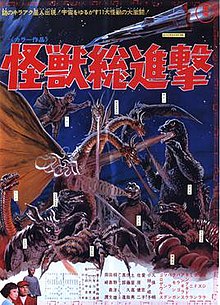| Destroy All Monsters | |||||
|---|---|---|---|---|---|
 Theatrical release poster | |||||
| Japanese name | |||||
| Kanji | 怪獣総進撃 | ||||
| |||||
| Directed by | Ishirō Honda | ||||
| Special effects by | Sadamasa Arikawa | ||||
| Screenplay by |
| ||||
| Produced by | Tomoyuki Tanaka[1] | ||||
| Starring | |||||
| Cinematography | Taiichi Kankura[1] | ||||
| Edited by | Ryohei Fujii[1] | ||||
| Music by | Akira Ifukube[1] | ||||
Production company | |||||
| Distributed by | Toho | ||||
Release date |
| ||||
Running time | 88 minutes[2] | ||||
| Country | Japan | ||||
| Language | Japanese | ||||
| Budget | ¥200,000,000 (equivalent to ¥729,524,213 in 2019)[3] | ||||
| Box office | ¥170,000,000 (equivalent to ¥620,095,581 in 2019) (Japan rentals)[4] | ||||
Destroy All Monsters (Japanese: 怪獣総進撃, Hepburn: Kaijū Sō-shingeki, lit. 'Monster All-Out Attack') is a 1968 Japanese epic kaiju film directed by Ishirō Honda, with special effects directed by Sadamasa Arikawa and supervised by Eiji Tsuburaya. The film, which was produced and distributed by Toho Co., Ltd, is the ninth film in the Godzilla franchise, and features eleven monster characters, including Godzilla, Mothra, Rodan, King Ghidorah, Anguirus, and Minilla. The film stars Akira Kubo, Jun Tazaki, Yukiko Kobayashi and Yoshio Tsuchiya.
In the film, humans have achieved world peace by the year 1999, and various giant monsters are confined to an area known as Monsterland. The monsters are freed from the area and are mind-controlled by aliens known as Kilaaks, who send them to attack major cities. When the monsters are freed from the Kilaaks' influence, the aliens send Ghidorah to challenge the other monsters.
Destroy All Monsters was released theatrically in Japan on August 1, 1968. The film was released by American International Pictures with an English-language dub in the United States on May 23, 1969. Contemporary American reviews were mixed, with praise mainly held for the climactic monster battle. Retrospectively, the film has received more praise, and is considered a favorite among Godzilla fans for its "audacious and simple story", "innovative action sequences",[5] and a "memorably booming" score by Akira Ifukube.
The film was followed by the tenth film in the Godzilla franchise, All Monsters Attack, released on December 20, 1969.
- ^ a b c d e Galbraith IV 1996, p. 149.
- ^ a b Galbraith IV 1996, p. 150.
- ^ Ryfle & Godziszewski 2017, p. 244.
- ^ Ryfle & Godziszewski 2017, p. 247.
- ^ Cite error: The named reference
Criterionwas invoked but never defined (see the help page).